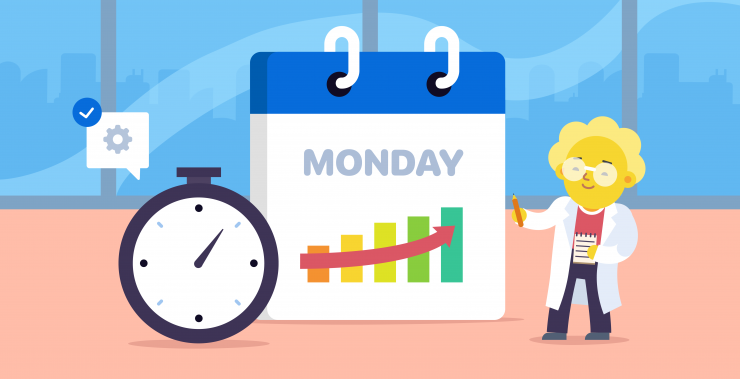Monday blues are understandable and acceptable. However, if your Monday Blues last until Friday, there is a severe problem in your working style or routine that you must address as soon as possible.
Without a doubt, being productive and focused at work throughout the week is a challenging task for most of us.
Nevertheless, beating the Monday blues or kickstarting your week on a positive note and remaining optimistic and focused throughout the week is not as difficult as you may think. All you have to do is follow the simple and easy-to-implement tips listed below.
We are confident that these suggestions will help you combat unproductive feelings to remain active and productive at work.
Understanding Monday blues and its impact on productivity
The Monday blues are feelings experienced by many employees: a lack of motivation, low energy or even anxiety at the start of the work week. These feelings can range from a mild reluctance to a deep dread of returning to work after a well-spent weekend. The psychological effects of the Monday blues manifest themselves differently for different people: some feel overwhelmed, and others feel additional stress and fatigue during the day. All of these emotional reactions eventually translate into physical reactions such as headaches or muscle tension, which also affect an employee’s ability to concentrate.
There appears to be a strong link between mood and productivity. Cognitive functions include decision-making, problem-solving, and memory, all of which are impaired when employees are low or stressed. As a result, staying focused and engaged at work can be quite a challenge, especially on Mondays. This can lead to delays in completing tasks beyond expectations, missed deadlines, and, ultimately, a decline in performance. These feelings of unproductivity can continue throughout the week, especially if employees are stressed due to missed targets, excessive workloads, or simply a lack of motivation.
The Monday blues can last more than one day if not properly managed. Burnout, stressful work stimuli, and a demotivating environment can be part of the cause. Burnout is the result of long-term stress, emotional exhaustion,n and a decline in job satisfaction, which in turn leads to disengagement and apathy. The accumulating lack of support, undefined expectations, and inability to communicate effectively in the workplace can exacerbate these feelings, trapping them in a cycle of unproductivity that can last all week.
10 Ways to stay focused and avoid Monday blues
The following are ten ways to stay active and attentive at work. All ideas are easy to implement and need few to no resources. However, we recommend that you follow most of them for the best outcome. Although you might find it challenging to adopt ideas such as walking meetings or exercise during work into your work routine at first, we are confident that you will love it and find it quite helpful after a few days.
1. Re-engineer the work environment
Feeling sluggish or unmotivated at work is a clear sign that you dislike your current work environment or have failed to adapt to it. As a result, the only option is to re-engineer or remodel it. There are various ways to improve the work environment, such as personalizing your workplace with your favorite items, plants, and family images, putting greater focus on natural lighting, and so on.
In addition, you can integrate more physical exercise into your working routines, such as walking, standing, or yoga. It will provide several health benefits, as well as reduce work absence and improve cognitive capabilities, mood, and productivity. Moreover, you can replace chairs and tables with standing desks. All of these little but promising measures will help you completely transform your work environment into an energetic workplace.
2. Set Attainable Goals
Setting goals is an excellent approach to staying focused and motivated at work. It will help you create your work strategy and design a work routine. Also, setting and accomplishing goals will demonstrate your commitment to your work and help you climb up the career ladder. For example, if you are a sales executive who aspires to be a sales manager, you can develop goals that will keep you motivated and help you get there.
However, it is critical to always set attainable goals. Setting unrealistic goals will overburden you with work and lead to feelings of exhaustion and tension, which will have a negative impact on your performance. For all of these reasons, make sure you always set realistic goals.
3. Celebrate small achievements
It’s normal to celebrate big achievements. However, celebrating little wins is equally important as it can significantly improve one’s inner work life. This will help you stay motivated and push you to achieve your objectives.
For example, if you have met your weekly or monthly goals, you can celebrate with your friends or family by going out to dinner or giving a little treat to your colleagues. This will not only lift your spirits but will also provide you with the strength you require to perform better.
Eventually, celebrating small wins will boost your performance and help you accomplish major successes. So, in a nutshell, regularly celebrate your and your coworkers’ small wins to keep yourself motivated and cheerful at work.
4. Block your calendar for breaks
Employees who are under pressure to meet a deadline are prone to staying at their workstations for long hours. However, working continuously without breaks is harmful to both physical and mental health. In addition, working for a long amount of time not only impairs your capacity to focus but also degrades your performance. For all of these reasons, taking breaks at work is critical to staying active and motivated.
You can either schedule breaks in your work calendar or take spontaneous breaks when you need one or are feeling low. Breaks might last from 5 to 20 minutes. It will provide a wealth of advantages, including increased creativity and focus, relief from mental fatigue, and improved office collaboration.
5. Avoid distractions
One of the most common causes of feeling unproductive at work is being distracted by something. It might be your coworkers, social media apps, or anything else. When you lose your attention, you lose productivity as well. Reduced productivity will have a negative impact on your willpower and mood, as well as your work-life balance. Some tactics for avoiding workplace distractions include:
- Work alongside productive people.
- Establish timelines for each task.
- Keep away your phone and other entertainment devices, and
- Placing career goals ahead of anything else.
Overall, the best way to minimize workplace distractions and have a productive day is to eliminate low-value activities and focus on meaningful work. Although it requires a great deal of discipline and patience, it is both doable and necessary.
6. Keep exercise equipment nearby
Most of desk jobs are physically passive, which has a negative influence on our health and raises the risk of heart disease. As a result, being physically active at work has become extremely important. You can keep workout equipment such as dumbbells, jumping ropes, a bouncing ball, and other items near your desk and use them whenever you feel unproductive.
Along with these equipment-based workouts, you can also practice squats, desk push-ups, planks, jumping jacks, and other exercises that do not require any equipment. All of these physical activities provide lots of advantages, including:
- It helps with chronic stress management.
- Improve your performance and productivity.
- Rejuvenate your mood and mental wellness.
- Improve your creativity,
- Lessen the risk of cognitive decline.
There is no doubt that exercising at work can be challenging to incorporate, but it will undoubtedly improve the working day.
7. Wear comfortable clothes
Along with all of these practices, wearing comfortable clothes at work can help you stay motivated and productive. It is a well-known fact that wearing clothes that make people feel comfortable and confident boosts their spirits. Moreover, a less restrictive dress code allows people to express themselves, which can help improve creative thinking. Further, when people are more at ease and innovative, it shows in their performance.
Moreover, being appropriately dressed for work helps you mentally separate work and leisure time, which may be quite beneficial for people who are easily distracted at work or wish to build boundaries between their professional and personal lives.
Nevertheless, remember that your attire must be very much in line with the company’s guidelines and appropriate for the job. For example, it should not be overly loud or overly casual.
8. Engage in standing or walking meetings
Walking meetings are the trending buzzword. It is a meeting that takes place on a walk rather than at an office, boardroom, or coffee shop. Several studies have found that the act of walking boosts creativity. Walking meetings also has several other advantages, such as
- It typically results in more honest exchanges between colleagues.
- It is more efficient than traditional face-to-face meetings, and
- Builds a better professional bond amongst employees.
Again, most meeting formats, such as one-on-ones, conference calls, and brainstorming sessions, are suitable for walking. Although walking during a meeting may seem unusual and it is not a practice that we follow on a regular basis, after a few times you may start enjoying it. Besides, it gives you respite from the typical work schedule and helps you feel productive.
9. Make small changes to your routine
It is not compulsory to exercise or attend walking meetings to stay active at work. Rather, you may simply alter your routine to combat work fatigue and become more active, productive, and motivated. For example, you can start tracking your steps with a pedometer. You might try to raise the targets every week or every month.
Moreover, rather than sending emails to your next-door colleagues, stroll across the hall and meet them in person. Another option to increase the number of steps in your day is to park your car further away from the entrance and take the stairway over the elevator. You can also switch your workstation for a change. All of these minor tweaks to your routine will help you stay active and engaged.
10. Use workplace tools and technologies
One of the primary reasons for feeling unmotivated at work is having the same schedule or assignments every day. However, using modern tools and technology, recurring or repetitive chores such as entering data into a job sheet or creating a to-do list can be automated. For example, suppose you are an HR professional who has to manually enter information about each candidate on a daily basis. In that case, you may easily automate this activity by using HR software.
Likewise, if you work as an accountant for a big corporation, you must employ modern accounting software to automate monotonous operations. This will not only allow you to redirect your focus to more important tasks, but it will also make you feel more focused and productive. Similarly, if you work in customer service, we recommend using CRM software that streamlines, automates and simplifies your operations.
So these are the 10 ways to stop being unmotivated and unproductive at work. All of the ideas are simple to incorporate into your work routine and need few to no resources. Although it may be difficult to adopt them at first, there is no turning back once you begin to enjoy and recognize their benefits.
11. Optimize Your Computer
A poorly optimized computer could be a hindrance to your overall productivity. If you have to deal with random crashes, freezes, and other performance problems, it is natural that you will not complete the work on time, not to mention the stress and feeling down because you are fed up with the issues.
From getting a cleaner tool to get rid of system junk and decluttering the desktop to checking and removing potential malware, there are multiple ways to make your computer run smoothly. It might take some time and help from others, but working on a properly optimized computer is much better for your productivity.
Как преодолеть понедельничную хандру?
It is pretty common to feel unmotivated at work from time to time. However, if you experience these feelings frequently, you must address them immediately. Spend time reducing stress during the day, or take direct action on the old routine with new strategies, take good and effective workplace productivity tools and technology, slot in between short workouts during work hours, schedule walking meetings, set realistic goals, and of course wear the right, comfortable clothes, and reward yourself with the little victories.
Some very small changes to the workspace and daily routines can bring achievement feelings as an exit from unproductive days and offer great morale and motivation to productivity at the workplace. Also very important to recognize is how mental health plays a crucial role in productivity.
If you’re feeling deflated or out of sync, a brief moment of mindfulness or a few deep breaths will often regenerate focus and energy. Creating an energized positive work culture where you and your coworkers can share tips and motivate each other will help reduce the feeling of isolation that usually accompanies the Monday blues.
Finally, a healthy mix of work and life is geared towards planning activities outside the work arena that make one happy, mitigate the emotional cost of the Monday blues, and better prepare one psychologically going into the work week.










Add comment